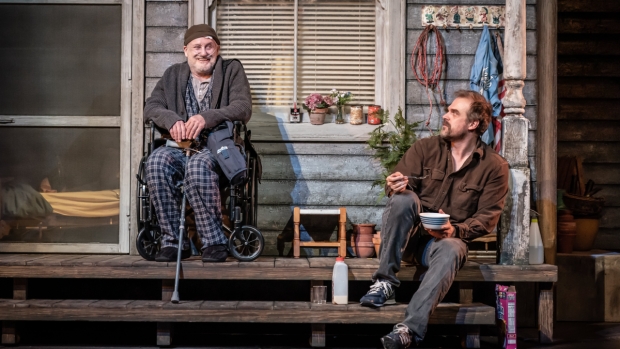Mad House starring David Harbour and Bill Pullman at Ambassadors Theatre – review
The world premiere production runs until 4 September

© Marc Brenner
There are two quite distinct plays on offer in Theresa Rebeck's Mad House, getting its world premiere at the Ambassadors Theatre. One is a black-as-pitch comedy drama about a dying patriarchal monster, memorably incarnated by Bill Pullman. The other is a profoundly sensitive and quite moving study about a child-man who has born the burden of his family's disfunction for his entire life, starring David Harbour of Stranger Things fame.
The trouble is that the two plays never quite gel into one satisfying whole. There is some terrific acting, a few great lines and moments of fitful brilliance. But the overall package fails to deliver.
To begin with, we are in Play One. Pullman's monstrously tyrannical Daniel is dying of emphysema in his run-down house, cared for by his shambling eldest son Michael (Harbour) whose efforts at kindness are rewarded with constant rebuffs – soup sent flying across the room – and malicious reminders of his time in the local mental hospital which supposedly killed his much-loved mother.
Pullman plays these scenes with a constantly mobile malignity, a kind of shifty delight in being just as revolting as he possibly can be. The arrival of a home hospice caregiver Lillian (a luminously still and sensitive performance from Akiya Henry) alters the dynamic though not Daniel's behaviour. "I don't think he's in pain because he's so energetically committed to inflicting it," Michael tells his sister on the phone.
A plot unfolds involving Daniel's will and his legacy and the greed of Michael's siblings, Nedward (who turns up and starts energetically rummaging through documents) and Pam. The whole act, played in the fixed setting of Frankie Bradshaw's cluttered, run-down kitchen, culminates in a scene of near farce, when two local hookers recruited by Michael to give his dad a good time (and perhaps kill him in the process) turn up. Nedward (Stephen Wight) is rather enjoying himself, but then things turn serious – just as Pam, in the shape of Sinéad Matthews, bursts through the door.
Play Two comes in the second act, when the set revolves to reveal a porch and Michael's lovingly-tended garden, and the mood turns serious as cartoonishly cruel Pam tries to get her brother re-committed and thus deprived of his inheritance. Harbour is astonishingly good in these slower, sadder scenes, with a great kind of burly baffledness at the way things are turning out, a terror of the return of his madness spreading over his sad face. His delivery is perfect too, finding comic beats in lines that are essentially heart-breaking.
But around him the plotting turns peculiar. Lillian, who has been the picture of competence, suddenly starts behaving less like a nurse and more like a guru; Pam's behaviour is on the Cruella de Vil screaming scale, and entirely unconvincing. The final scene, which reunites Pullman and Harbour, feels unearned.
Director Moritz Von Stuelpnagel holds the wildly divergent tonal shifts together as best he can, and the cast are never less than watchable but the overall impact is strangely muffled.












